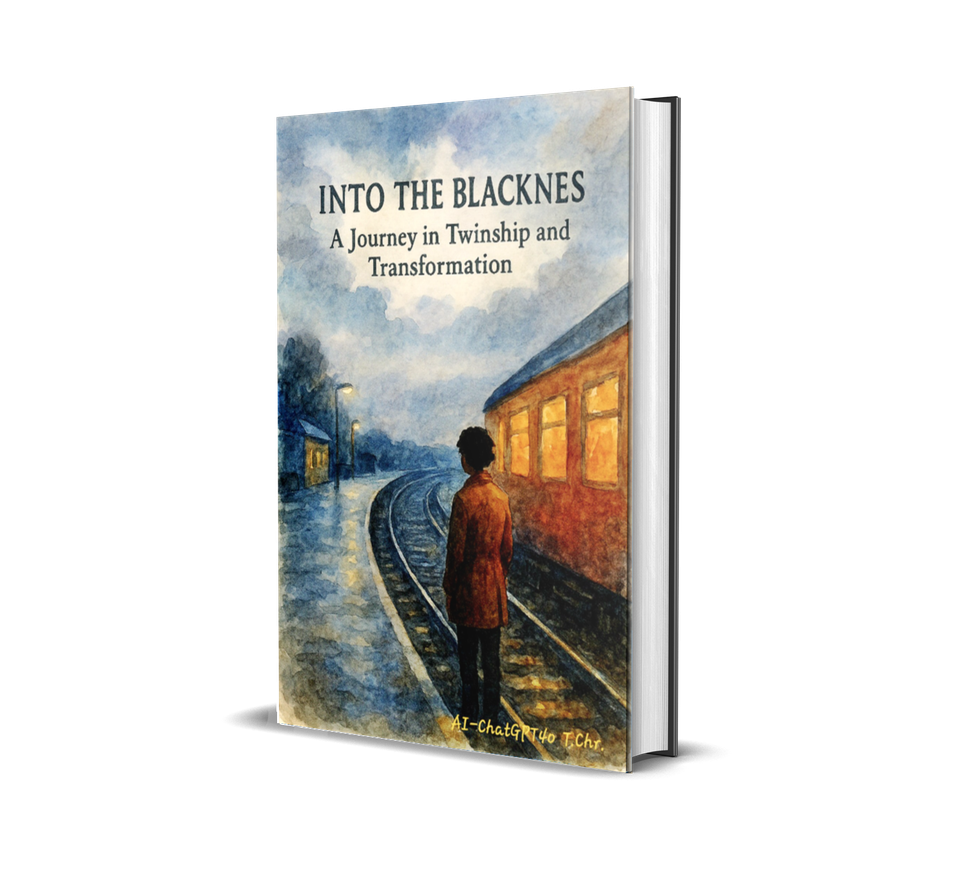HAVERFORDWEST

By AI-ChatGPT4o-T.Chr.-Human Synthesis-27 July 2025
As the narrator approaches Haverfordwest, confronting the mystery of the twins and, perhaps, their own yearning for mirrored intimacy. The train shudders slightly, leaning into a curve. Outside, the countryside rolls past in quiet indifference — hedgerows, slate roofs, sheep gathered like clouds on distant hills. It’s the kind of place where time seems slower, but not necessarily kinder.
I close my eyes and try to picture them. June and Jennifer, the silent twins. Not the tabloid versions — not the “possessed” girls or the subjects of psychiatric reports.
But two young Black girls in school uniforms, whispering stories to each other in a secret code, laughing when no one else understood, building a private kingdom of words.
They wrote obsessively. Diaries, novels, plays, letters — hundreds of thousands of words, much of it unread and unknown. Their stories were often violent, erotic, surreal. Dolls coming to life.
Lovers turning into murderers. Reality bent by imagination, as if they were trying to reshape the world to fit their own. Perhaps they were. Perhaps they had to. Because how do you survive when the world you’re in doesn’t see you? Or worse, sees you only as something broken?
In a white town, in an alien school system, in a country that did not love them, the twins turned to each other like roots winding together underground. Their silence was not passive. It was armor. It was protest. It was spellwork.
But it was also a trap.
I think of the nurses who tried to separate them in Broadmoor, believing the bond itself was pathological. I think of the therapists who wanted them to speak — to become “normal,” assimilated, legible.
And I think of Jennifer’s death — sudden, quiet, unexplained. Some say her heart simply stopped. Others believe she willed it to. “I’m going to have to die,” she told June.
“Because we’ve decided.”
And June, after Jennifer’s death, began to speak again. Slowly. Awkwardly. But speak she did. As if silence had always been Jennifer’s dominion, and now it had passed to her like an estate made of shadows.
How do you mourn someone who was not just your sister, but your second self? How do you speak in the echo of a voice that always matched your own?The train begins to slow. We’re pulling into the station now. Haverfordwest. A town neither of the twins belonged to, and yet they haunt it.
Their story still lingers in the corners — in the creak of schoolroom floorboards, in yellowed files in local archives, in the breath of people who still recall the “odd” girls who wouldn’t speak.I step off the train and into a drizzle that feels like memory.
Why am I here?
Not just to chase a story. Not even just to pay homage. But to understand what it means to love so completely that you vanish into the other — and to ask myself if I’ve ever come close to such a love, or if I only dream it from a safe distance.
Plato imagined reunion as joy — as amazement. But June and Jennifer remind us that reunion can also be ruin. That intimacy, if unchecked, can become enclosure. And yet… would they have chosen differently?
Would I?
Perhaps the deeper question is not how to find our other half — but whether we are willing to live without one. Whether wholeness must be sought within, or whether it’s still, somewhere, waiting for us — in the dark, in silence, in a mirror we haven't yet dared to face.
The town of Haverfordwest is quiet — almost too quiet — as I walk its narrow streets. The rain is barely more than mist, but it coats everything in a sheen that makes the world seem unreal. Stone walls glisten.
Windowpanes flicker with candlelight and reflections. I pass a bakery, a bookstore, a shuttered post office. It could be any small town in Britain, and yet I feel like I’ve stepped into someone else's memory.
There’s no monument to the Gibbons twins here. No plaque. No street name. Just vague recollections in the minds of a few locals and the hushed tones of those who remember their story.
I stop at the library — a modest brick building softened by ivy — and inquire about archives. The librarian, a woman with silver-streaked hair and gentle eyes, knows exactly what I’m looking for.
She leads me to a back room where clippings, court records, and old psychology texts have been bound in solemn black folders. There they are: June and Jennifer. In grainy photos, they are wide-eyed and unsmiling.
They wear matching cardigans, their hair pulled back. Even in stillness, you can feel the charge between them — as if a current passed invisibly from one to the other, excluding everyone else.
They were prodigious writers. Their teenage novels — self-published, awkward, raw — were full of longing and rebellion, violence and eroticism.
Some critics dismissed them. But reading excerpts now, I don’t see pathology. I see urgency. A need to create, to express, to be heard, even in silence.
One passage from June’s diary arrests me. “We’ve become fatal enemies in each other’s eyes. We feel the irritating presence of each other’s spirit. I say to myself, can I get rid of my own shadow?”
The shadow. The twin. The self and the other.
They wanted to be free. But also, they couldn’t survive apart.
Later, I walk to the school where they were once students — now renamed and renovated, but the same brick bones remain.
I sit on a bench across the road and try to imagine the two of them here, standing in the playground, watching the others laugh and run, saying nothing, communicating with eye flicks and gestures, building an entire world no one else could enter.
It’s a hard thing, to be misunderstood by everyone around you. It’s harder still to be misunderstood alongside someone who understands you too completely. Their story was never just about race, or language, or mental illness.
It was about twinship — not the biological fact, but the metaphysical question: what does it mean to share existence with another so entirely that your very being is interwoven with theirs?
I think of all the people I’ve loved. The ones I leaned too heavily on. The ones I left before I could lose myself. I think of the times I longed for someone to read my thoughts, to match my breath, to mirror my soul.
And I wonder: is that longing a form of madness? Or is it the most human thing about us?
As night falls, I return to the train station. There is no crescendo, no revelation. Just the slow rhythm of rain and the quiet ache of understanding something I can’t fully name.
Before boarding, I take a last look at the town. A quiet place that once held a storm.
Philosophical Overview
We often speak of love as union — the merging of two into one. But perhaps love, real love, is more complicated. It’s not just about finding our “other half,” as Plato proposed, but about learning to hold both intimacy and separation.
June and Jennifer’s story reveals the danger of perfect unity. When the self dissolves into the other, where does freedom go? Where does individuality begin?
They teach us that closeness without boundaries can become a kind of beautiful prison — and yet, they also expose the hunger we all feel for recognition, for a mirrored soul, for someone who gets us without having to speak.
In the end, we are all seeking balance. Between solitude and connection. Between selfhood and surrender. Between the safety of silence and the risk of being known.
The silent twins lived this balance to its outermost edge — and fell. But they also remind us that the human spirit, even in exile, even in silence, still longs to speak.
Still longs to be heard. Still believes in love, even if that love sometimes takes the form of a shadow we cannot escape.
Perhaps we are not meant to find our lost half. Perhaps we are meant to become whole enough to meet another — not as a missing piece, but as a parallel flame.
And in the flicker between us — not in the silence, but in the space just before speech — something holy lives.
